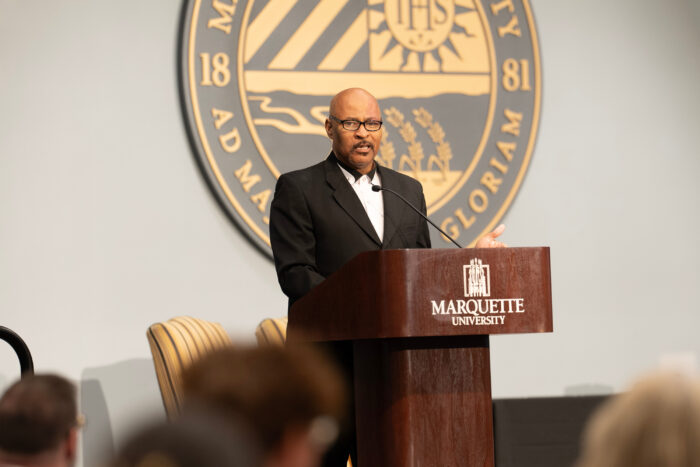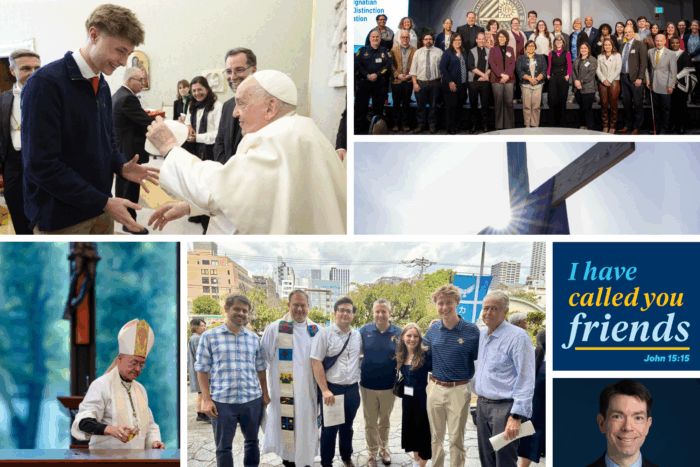Dear colleagues,
Amid the joyful moments of Commencement weekend a few weeks ago, we both had a similar reflective moment as we watched graduates walk proudly across the stage, smiling and waving to cheering loved ones in the audience. This is why we do the work we do: to educate outstanding people who will make our world better.
With Marquette 2031: Securing Our Future, we have a once-in-a-generation opportunity to consider strategic large-scale ideas. This includes working through difficult decisions to build the framework needed to ensure that the significance and value of the Marquette experience will evolve and flourish for future generations.
We are finishing the first phase of this initiative during which we met with more than 1,000 people across over 40 academic and operational stakeholder groups. We hope our conversations provided reassurances about the process while we gathered valuable input. These meetings and the online portal have served as a valuable funnel for early ideas. A full list of these meetings is available on the Securing Our Future Teams site.
In our meetings with you, we’ve heard everything from frustration and fear to relief that the university is doing this strategically; we’re also hearing genuine interest in new ideas and creative possibilities. With each meeting we’re hearing more and more great ideas, and we appreciate how many of you are bringing your spirit of ingenuity and thoughtful level-headedness to these important conversations.
At the same time, the 26-member Securing Our Future Steering Committee has been studying university financials so members can be informed and prepared to engage with unit leaders when they put forth plans for consideration. We’ve challenged members to project their expertise to the university level, remaining focused on the larger organization.
There are so many talented people at Marquette, and each of you knows your area best. We’ve asked leaders of colleges, schools and administrative units to engage their teams and prepare ideas for how they can contribute to cost reductions, improved efficiencies and — where concrete and demonstrable — increased revenue. Thanks to the offices of Institutional Research and Analysis and Finance, our leaders have vital financial and operational data needed to guide their work. We are eager to hear their insights and recommendations when they meet with the Steering Committee in June where we will discuss the ideas as a group.
The timeline below shows the phased approach the Securing Our Future Steering Committee will take in the coming months. As co-chairs, we are committed to updating the campus community throughout the summer through written messages, updates in the Securing Our Future Teams site and a town hall meeting via Teams (watch for more information in Marquette Today).

Here is additional information on the first two phases.
Phase 1: INPUT AND DATA REVIEW (mid-March – May)
Gather input in stakeholder meetings, review financials and create pipeline of ideas
Steering Committee:
- Co-chairs meet with campus stakeholder groups to discuss the initiative, gather input and ask for their help in identifying ways to reduce costs, improve efficiencies and increase revenue.
- An open portal is created so anyone at Marquette can share ideas and questions anonymously.
- Steering Committee members receive financials across university units and discuss various financial dynamics.
- Three committee subgroups review the 2020-21 Academic Workstreams, the Gray Associates report and ideas submitted through the Securing Our Future online portal. Subgroups identify items needing further evaluation, common themes, redundancies and ideas to explore.
- Ideas will be routed to all appropriate unit leaders for consideration and evaluation.
University leaders and their teams:
- Leaders are asked to engage their unit teams to discuss opportunities and collaborate on potential ideas.
- With the help of OIRA and Finance, campus leaders have relevant data for their areas to inform their efforts.
- Deans are asked to consider:
- College and department financials over time (5-year trend)
- Department financials over time (5-year trend)
- College, program and course enrollment trends
- Trends for student credit hours and teaching
- Leaders of administrative areas receive area financials (5-year trend) and headcounts over time to consider along with responsibilities, services and programs provided by their units.
- Deans are asked to consider:
- Co-chairs share with unit leaders a template for recommendations for consistency among units.
Phase 2: UNIT LEADERS SHARE IDEAS (June)
Academic and administrative leaders share plans with Steering Committee
Steering Committee:
- Committee members are divided into two groups to meet with academic and administrative leaders and hear their initial recommendations; all Steering Committee members may attend all the meetings. Each group comprises a balance of faculty and staff. The co-chairs will attend all meetings.
- The committee’s role is to fully understand all the components of proposed recommendations, filter through members’ relevant expertise, ask thoughtful questions, offer considerations and think through who else may be affected by a particular plan. Throughout these meetings, members are expected to note common themes and opportunities for potential cross-collaboration among units (or across the university) for larger impact.
University leaders and their teams:
- Throughout June, each academic and administrative unit leader will discuss their initial plans and recommendations. The goal of the presentation is to help the Steering Committee understand the rationale behind the recommended changes. This phase is intended to be collaborative, with leaders of the units working along with the Steering Committee to find opportunities within and across colleges, departments and operating units.
Ongoing communication with campus
Since the announcement of Marquette 2031: Securing Our Future, we have been committed to ongoing campus communication through multiple channels, and we will continue to do this throughout the summer. The Teams site hosts new materials and updates throughout the process. The FAQ is updated consistently with new questions relevant to the scope of Securing Our Future and related financial context. University fact sheets address topics frequently mentioned at campus meetings or in the portal. Stories in Marquette Today highlight progress, committee membership additions and new materials.
We look forward to continuing to engage with you on this important work over the coming months. As we move into the next phase, remember to submit ideas to the portal so we can vet them and pass them along to appropriate units for timely consideration with their teams.
With gratitude,
Jill Guttormson
Dean of the College of Nursing, co-chair of Marquette 2031: Securing Our Future
Ralph Weber
Vice president and general counsel, co-chair of Marquette 2031: Securing Our Future



